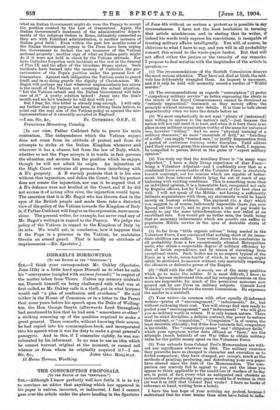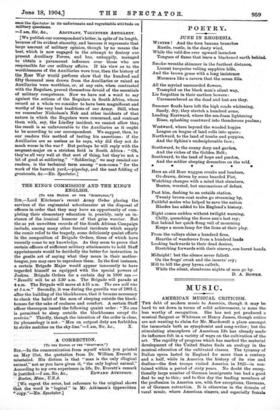THE CONSCRIPTION PROPOSALS. To TEl EDITOR QP THE "spscrAros...] Sin,—Although
I know perfectly well how futile it is to try to convince an editor that anything which has appeared in his paper is untrue, incorrect, or indiscreet, I feel I cannot pass over the article under the tbove beading in the Spectator of June 4th without as serious a protest as is possible in my circumstances. I have not the least hesitation in terming that article mischievous, and in stating that its writer, if indeed his words truly express his convictions, is incapable of treating military affairs intelligently. You will, of course, be oblivious to what I have to say, and you will in all probability commit this screed to the waste-paper basket. But that will not affect either the justice or the'veracity of my remarks. I propose to deal seriatim with the ineptitudes of the article in question •• (1) The recommendations of the Norfolk Commission deserve the most serious attention. They have not died at birth, the mid- wife has deliberately strangled them. An inquest is necessary, and if it only be held will assuredly record a verdict of "Wilful murder."
• (2) The recommendations . as regards "conscription" (I prefer "compulsory military service" as better expressing the ideals in the minds of the Royal Commissioners) cannot be dismissed as "entirely unpractical," inasmuch as they merely affirm• the principle without entering into details. It is time to talk' about impracticality when we have the details before us.
(3) We most emphatically do not want "plenty of [untrained] men willing to answer to the nation's call,"—just because the nation will not call until it is hurt, and when it is hurt there is no place in any military organisation worthy of the name for untrained men, however "willing." And no mere "physical training of a military character," no mere "essentials of drill," no "handling of a rifle," can supply- "trained men," or justify dispensation from a period of continuous training under discipline. Until editors (and their readers) grasp this elemental fact we shall, I suppose, be compelled to peruse drivel in the guise of "expert military opinion.'
(4) You truly say that the Auxiliary Force is "in many ways imperfect." I have a daily living experience of that Force— being a Volunteer Adjutant—and I confidently aver that as a combatant force seven-tenths of the Volunter Force is absolutely beneath contempt, not for reasons which are capable of better- ment, but from inherent defects lying far out of reach of any tinkering with existing conditions. This is something more than an individual opinion, it is a lamentable fact, recognised not only by Regular officers, but by Volunteer officers of the best class as well. I will not speak of the Militia: not having a sufficiently intimate acquaintance with them, my statements would be based merely on hearsay evidence. The payment (5s. a day) which you suggest is, of course, ludicrously impossible (have you ever figured out the cost ?), and to give such a rate of pay would be merely to pay the same tatterdemalions who now enlist at an exorbitant rate. You would get no better men, the truth being that no monetary inducements which are possible can suffice to popularise Militia service in the eyes of desirable strata of society.
(5) So far from "little organic reform" being needed in the Volunteer Force, I am convinced that nothing short of its imme- diate abolition can suffice. Your writer draws his conclusions in all probability from a few exceptionally situated Metropolitan units, who attain a respectable degree of military efficiency by dint of lavish expenditure, and by reason of recruiting from exceptional strata. Such bodies are in no respect typical of the Force as a whole, seven-tenths of which, in my opinion, might safely be abolished to-morrow without very materially impairing the offensive or defensive power of the Empire.
(6) "Skill with the rifle" is merely one of the many qualities which go to make the soldier. It is most difficult, I know, to make a layman understand this, and lay misapprehensions on this score are responsible for much of the pernicious nonsense now poured out by our Press on military subjects. Consult Lord Wolseley's evidence before the recent Commission. He expresses the matter in a nutshell.
(7) Your writer—in common with other equally ill-informed writers—prates of "encouragement," "inducements," &c., but without reckoning their cost. You will always find men ready to pocket your "encouragement" and "inducements" who will give you no military worth in return. It is only human nature. There must be strict discipline, a definite contract, the power to enforce that contract, or "compulsion." "Compulsion" is, of course, the least desirable ethically; but if the free contracts fail, compulsion is inevitable. The "compulsory camps" and "obligatory drills," which your egregious writer dubs offhand as "fussy," are the attempts (much belated) of our War Office to obtain military value for the public money spent on the Volunteer Force.
(8) Your extracts from Colonel Peel's Memorandum are with- out any signifipance whatever in 1904. The military exercises they prescribe have so changed in character and execution as to forbid comparison; they have changed, par eremple, much as -the methods of printing, producing, and distributing your own paper have altered since the date of the Memorandum. The com- parison can scarcely fail to appeal to you, and the ideas you appear to think applicable to the conditions of warfare of to-day are, in point of fact, every whit as antiquated and obsolete as instructions for producing your paper would be if written in 1858 (or was it in 1802 that Colonel Peel wrote ? I have no books of
reference at band, writing from a hotel). -
I have the less hope of your noticing my protest, because I understand that far wiser brains than mine have failed to influ. ence the Spectator in its unfortunate and regrettable attitude on military questions.
[We publish our correspondent's letter, in spite of its length, because of its evident sincerity, and because it represents that large amount of military opinion, though by no means the best, which is now engaged in the attempt to destroy our present Auxiliary Forces, and has, unhappily, managed to obtain a paramount influence over those who are responsible for our military affairs. If his view as to the worthlessness of the Auxiliaries were true, then the history of the .Boer War would perforce show that the hundred and fifty thousand men drawn from the Auxiliaries or raised as Auxiliaries were worthless, or, at any rate, when contrasted with the Regulars, proved themselves devoid of the essentials of military competence. Now we have not a word to say against the actions of the Regulars in South Africa, whose record as a whole we consider to have been magnificent and worthy of the very best traditions of our Army. Still, when we remember Nicholson's Nek and other incidents of that nature in which the Regulars were concerned, and contrast them with, say, the Lindley incident, we cannot allow that the result is as unfavourable to the Auxiliaries as it ought to be according to our correspondent. We suggest, then, to our readers this method of testing his assertions : if the Auxiliaries are as useless as he says, why did they not do much worse in the war ? But perhaps he will reply with the sergeant-major on a stricken field in South Africa : "Oh, they're all very well at that sort of thing, but they're not a bit of good at soldiering." "Soldiering," we may remind our readers, is the technical term among "non-corns." for the work of the barrack yard,—pipeclay, and the neat folding of greatcoats, &c.—ED. Spectator.]







































 Previous page
Previous page